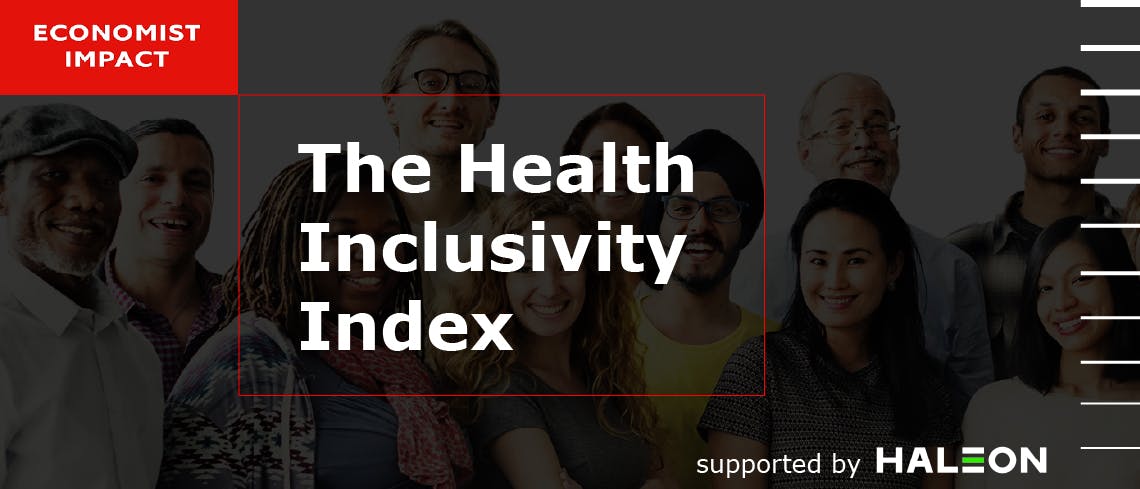Better health for all

Health inequity is unfair, unjust, and avoidable.1
The UN Sustainable Development Goal 3 ‘good health and wellbeing’ seeks to ‘ensure healthy lives and promote well-being for all at all ages.’2 Achieving this goal and universal health coverage cannot be achieved without equitable and inclusive access to health care.
Pursuing health equity means striving for the highest possible standard of health for all people and giving special attention to the needs of those at greatest risk of poor health, based on social conditions.1
-
Economist Impact’s Health Inclusivity Index
Haleon is supporting the Health Inclusivity Index developed by Economist Impact, a pioneering new measurement of health inclusivity in 40 countries across 37 indicators. The aim is to expand the study to include more countries in subsequent years.
The Economist Impact defines health inclusivity as the process of removing the personal, social, cultural, and political barriers that prevent individuals and communities from experiencing good physical and mental health, and a life fully realised.
The Index measures a country’s progress towards good mental, physical, and social health for all. It assesses the state of health inclusivity by analysing key data across three domains of indicators (see figure below).
The research aims to facilitate dialogue with policymakers and health professionals and spur action on health inclusivity.
The Index assesses health inclusivity across three domains
Domain 1: Health in society (33.3%)

1.1) Health as a priority (40%)
1.1.1 Right to health 1.1.2 Wellbeing promotion 1.1.3 Social determinants of health in policy 1.1.4 Vulnerable population groups 1.1.5 Health exclusion 1.1.6 Health inequalities monitoring system 1.2) Health in all policies (40%) 1.2.1 Intersectoral cooperation policy 1.2.2 Tobacco control 1.2.3 Marketing of foods to children 1.2.4 Dietary guidelines for healthy eating 1.2.5 National policy on alcohol 1.2.6 Taxes on alcohol and unhealthy foods 1.2.7 Food insecurity policies 1.2.8 Oral health policy 1.3) “Spirit of implementation” (20%) 1.3.1 Implementation of SDGs (% achieved) Domain 1: Health in society (33.3%)

1.1) Health as a priority (40%)
1.1.1 Right to health 1.1.2 Wellbeing promotion 1.1.3 Social determinants of health in policy 1.1.4 Vulnerable population groups 1.1.5 Health exclusion 1.1.6 Health inequalities monitoring system 1.2) Health in all policies (40%) 1.2.1 Intersectoral cooperation policy 1.2.2 Tobacco control 1.2.3 Marketing of foods to children 1.2.4 Dietary guidelines for healthy eating 1.2.5 National policy on alcohol 1.2.6 Taxes on alcohol and unhealthy foods 1.2.7 Food insecurity policies 1.2.8 Oral health policy 1.3) “Spirit of implementation” (20%) 1.3.1 Implementation of SDGs (% achieved) Domain 2: Inclusive health systems (33.3%) 
2.1) Health spending and coverage (40%) 2.1.1 Government health expenditure 2.1.2 Population spending more than 10% on health 2.1.3 Impoverishment due to out-of-pocket spending 2.1.4 Migrant healthcare coverage 2.2) Infrastructure and workforce (40%) 2.2.1 Physicians 2.2.2 Nursing and midwifery personnel 2.2.3 Dentistry personnel 2.2.4 Pharmacists 2.2.5 Healthcare provider training 2.2.6 Electronic health records 2.2.7 Telehealth 2.2.8 Public and private sector coordination 2.3) “Spirit of implementation” (20%) 2.3.1 Universal Health Care service coverage index Domain 3: People and Community Empowerment (33.3%) 
3.1) Cultures of practice (40%) 3.1.1 Person-centred health care 3.1.2 Translation services 3.1.3 Community companions 3.1.4 Case management 3.2) People empowerment (40%) 3.2.1 Health literacy programmes 3.2.2 Health information for self-care 3.2.3 Health outreach programmes 3.2.4 Public/community participation in policy 3.3) “Spirit of implementation” (20%) 3.3.1 Human Development Index Domain 2: Inclusive health systems (33.3%) 
2.1) Health spending and coverage (40%) 2.1.1 Government health expenditure 2.1.2 Population spending more than 10% on health 2.1.3 Impoverishment due to out-of-pocket spending 2.1.4 Migrant healthcare coverage 2.2) Infrastructure and workforce (40%) 2.2.1 Physicians 2.2.2 Nursing and midwifery personnel 2.2.3 Dentistry personnel 2.2.4 Pharmacists 2.2.5 Healthcare provider training 2.2.6 Electronic health records 2.2.7 Telehealth 2.2.8 Public and private sector coordination 2.3) “Spirit of implementation” (20%) 2.3.1 Universal Health Care service coverage index Domain 1: Health in society (33.3%)

1.1) Health as a priority (40%)
1.1.1 Right to health 1.1.2 Wellbeing promotion 1.1.3 Social determinants of health in policy 1.1.4 Vulnerable population groups 1.1.5 Health exclusion 1.1.6 Health inequalities monitoring system 1.2) Health in all policies (40%) 1.2.1 Intersectoral cooperation policy 1.2.2 Tobacco control 1.2.3 Marketing of foods to children 1.2.4 Dietary guidelines for healthy eating 1.2.5 National policy on alcohol 1.2.6 Taxes on alcohol and unhealthy foods 1.2.7 Food insecurity policies 1.2.8 Oral health policy 1.3) “Spirit of implementation” (20%) 1.3.1 Implementation of SDGs (% achieved) Domain 2: Inclusive health systems (33.3%) 
2.1) Health spending and coverage (40%) 2.1.1 Government health expenditure 2.1.2 Population spending more than 10% on health 2.1.3 Impoverishment due to out-of-pocket spending 2.1.4 Migrant healthcare coverage 2.2) Infrastructure and workforce (40%) 2.2.1 Physicians 2.2.2 Nursing and midwifery personnel 2.2.3 Dentistry personnel 2.2.4 Pharmacists 2.2.5 Healthcare provider training 2.2.6 Electronic health records 2.2.7 Telehealth 2.2.8 Public and private sector coordination 2.3) “Spirit of implementation” (20%) 2.3.1 Universal Health Care service coverage index Domain 3: People and Community Empowerment (33.3%) 
3.1) Cultures of practice (40%) 3.1.1 Person-centred health care 3.1.2 Translation services 3.1.3 Community companions 3.1.4 Case management 3.2) People empowerment (40%) 3.2.1 Health literacy programmes 3.2.2 Health information for self-care 3.2.3 Health outreach programmes 3.2.4 Public/community participation in policy 3.3) “Spirit of implementation” (20%) 3.3.1 Human Development Index Domain 3: People and Community Empowerment (33.3%) 
3.1) Cultures of practice (40%) 3.1.1 Person-centred health care 3.1.2 Translation services 3.1.3 Community companions 3.1.4 Case management 3.2) People empowerment (40%) 3.2.1 Health literacy programmes 3.2.2 Health information for self-care 3.2.3 Health outreach programmes 3.2.4 Public/community participation in policy 3.3) “Spirit of implementation” (20%) 3.3.1 Human Development Index Domain 1: Health in society (33.3%) Domain 1: Health in society (33.3%)
Domain 1: Health in society (33.3%) 
Domain 1: Health in society (33.3%) 1.1) Health as a priority (40%)
Domain 1: Health in society (33.3%) 1.1.1 Right to health Domain 1: Health in society (33.3%) 1.1.2 Wellbeing promotion Domain 1: Health in society (33.3%) 1.1.3 Social determinants of health in policy Domain 1: Health in society (33.3%) 1.1.4 Vulnerable population groups Domain 1: Health in society (33.3%) 1.1.5 Health exclusion Domain 1: Health in society (33.3%) 1.1.6 Health inequalities monitoring system Domain 1: Health in society (33.3%) 1.2) Health in all policies (40%) Domain 1: Health in society (33.3%) 1.2.1 Intersectoral cooperation policy Domain 1: Health in society (33.3%) 1.2.2 Tobacco control Domain 1: Health in society (33.3%) 1.2.3 Marketing of foods to children Domain 1: Health in society (33.3%) 1.2.4 Dietary guidelines for healthy eating Domain 1: Health in society (33.3%) 1.2.5 National policy on alcohol Domain 1: Health in society (33.3%) 1.2.6 Taxes on alcohol and unhealthy foods Domain 1: Health in society (33.3%) 1.2.7 Food insecurity policies Domain 1: Health in society (33.3%) 1.2.8 Oral health policy Domain 1: Health in society (33.3%) 1.3) “Spirit of implementation” (20%) Domain 1: Health in society (33.3%) 1.3.1 Implementation of SDGs (% achieved) Domain 2: Inclusive health systems (33.3%) Domain 2: Inclusive health systems (33.3%) Domain 2: Inclusive health systems (33.3%) 
Domain 2: Inclusive health systems (33.3%) 2.1) Health spending and coverage (40%) Domain 2: Inclusive health systems (33.3%) 2.1.1 Government health expenditure Domain 2: Inclusive health systems (33.3%) 2.1.2 Population spending more than 10% on health Domain 2: Inclusive health systems (33.3%) 2.1.3 Impoverishment due to out-of-pocket spending Domain 2: Inclusive health systems (33.3%) 2.1.4 Migrant healthcare coverage Domain 2: Inclusive health systems (33.3%) 2.2) Infrastructure and workforce (40%) Domain 2: Inclusive health systems (33.3%) 2.2.1 Physicians Domain 2: Inclusive health systems (33.3%) 2.2.2 Nursing and midwifery personnel Domain 2: Inclusive health systems (33.3%) 2.2.3 Dentistry personnel Domain 2: Inclusive health systems (33.3%) 2.2.4 Pharmacists Domain 2: Inclusive health systems (33.3%) 2.2.5 Healthcare provider training Domain 2: Inclusive health systems (33.3%) 2.2.6 Electronic health records Domain 2: Inclusive health systems (33.3%) 2.2.7 Telehealth Domain 2: Inclusive health systems (33.3%) 2.2.8 Public and private sector coordination Domain 2: Inclusive health systems (33.3%) 2.3) “Spirit of implementation” (20%) Domain 2: Inclusive health systems (33.3%) 2.3.1 Universal Health Care service coverage index Domain 3: People and Community Empowerment (33.3%) Domain 3: People and Community Empowerment (33.3%) Domain 3: People and Community Empowerment (33.3%) 
Domain 3: People and Community Empowerment (33.3%) 3.1) Cultures of practice (40%) Domain 3: People and Community Empowerment (33.3%) 3.1.1 Person-centred health care Domain 3: People and Community Empowerment (33.3%) 3.1.2 Translation services Domain 3: People and Community Empowerment (33.3%) 3.1.3 Community companions Domain 3: People and Community Empowerment (33.3%) 3.1.4 Case management Domain 3: People and Community Empowerment (33.3%) 3.2) People empowerment (40%) Domain 3: People and Community Empowerment (33.3%) 3.2.1 Health literacy programmes Domain 3: People and Community Empowerment (33.3%) 3.2.2 Health information for self-care Domain 3: People and Community Empowerment (33.3%) 3.2.3 Health outreach programmes Domain 3: People and Community Empowerment (33.3%) 3.2.4 Public/community participation in policy Domain 3: People and Community Empowerment (33.3%) 3.3) “Spirit of implementation” (20%) Domain 3: People and Community Empowerment (33.3%) 3.3.1 Human Development Index -
Haleon’s commitment to health inclusivity
By 2025, we aim to help 50 million people per annum to gain access to opportunities for better everyday health irrespective of their age, physical and mental capabilities, gender, ethnicity, or sexual orientation.
We aim to achieve this in three key ways: driving change through our brands; empowering self-care; and investing in thought leadership and research.
